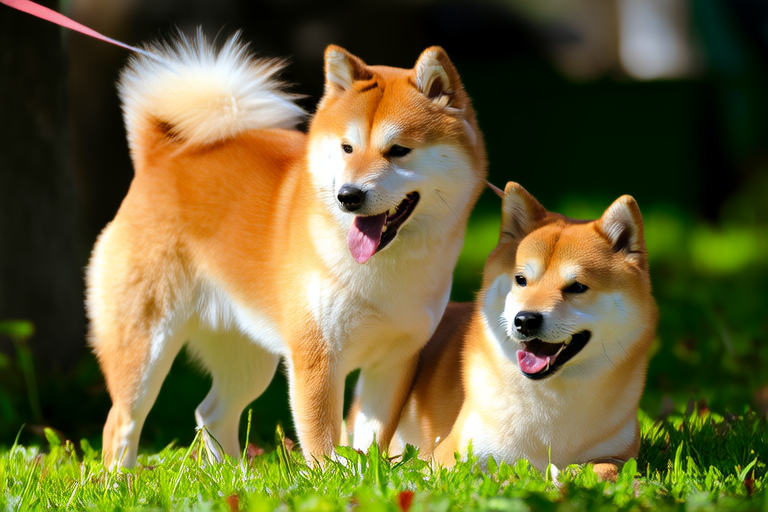Shiba Inus and Their Unique Traits That Set Them Apart
The Shiba Inu is one of the oldest and smallest breeds of dog native to Japan. Originating from the mountainous regions of Honshu, Shiba Inus were initially bred for hunting purposes. These dogs were valued for their keen sense of smell and agility, which allowed them to chase and flush out small game like birds and rodents. Today, they have become popular pets worldwide, admired for their unique appearance and distinct personality.
Distinctive Physical Traits
Shiba Inus are known for their compact build and fox-like appearance. They typically stand about 35-43 cm (14-17 inches) at the shoulder and weigh between 7-11 kg (15-24 pounds), making them one of the smaller breeds. Their double coat is thick and dense, designed to protect them against harsh weather conditions. The outer coat is straight and stiff, while the undercoat is soft and plush, providing insulation.
Color variations are another defining characteristic of this breed. The most common colors are red or red sesame (a mix of red hairs with black tips), cream, and black and tan. White markings may appear on the face, throat, chest, and legs, adding to their striking appearance. Their triangular ears are erect and alert, and their almond-shaped eyes give them an intelligent and expressive look. Shiba Inus also have a curled tail, which is carried over their back, adding to their distinctive appearance.
Unique Personality Traits
One of the most notable aspects of the Shiba Inu is their independent nature. This breed is known for being self-reliant and can sometimes exhibit stubbornness, especially during training sessions. However, this independence also makes them resourceful and adaptable, qualities that have served them well throughout history.
Shiba Inus are highly alert and observant, making them excellent watchdogs. They are quick to notice any unusual activity around their home and will bark to alert their owners. Despite their alertness, they are not aggressive and prefer to use their vocalizations to communicate rather than resorting to physical confrontation.
Loyalty is another hallmark of the Shiba Inu. While they may be reserved with strangers, they form strong bonds with their families. Once they trust you, they are devoted companions, always ready to provide comfort and affection. Their loyalty is often accompanied by a playful spirit, making them delightful companions for children and adults alike.
Intelligence and Training Challenges
Shiba Inus are intelligent dogs, capable of learning new commands and tricks with relative ease. However, their independence can sometimes make them challenging to train. Consistency and positive reinforcement are key when working with this breed. It’s important to establish yourself as the leader early on to ensure your Shiba Inu respects your authority.
Training sessions should be short and engaging to keep their attention. Using treats and praise as rewards can help motivate them to learn. Socialization is also crucial, especially during puppyhood, to help them develop good manners and reduce anxiety in unfamiliar situations. Early socialization can prevent behavioral issues later in life, ensuring your Shiba Inu becomes a well-rounded and happy companion.
Common Health Issues
Like all breeds, Shiba Inus are prone to certain health issues. One of the most common problems is hip dysplasia, a condition where the hip joint doesn’t fit properly into the socket, leading to discomfort and mobility issues. Regular exercise and maintaining a healthy weight can help reduce the risk of developing this condition.
Another concern is patellar luxation, where the kneecap dislocates from its normal position. This can cause pain and lameness in affected dogs. Regular check-ups with a veterinarian can help catch these issues early and provide appropriate treatment options.
Shiba Inus are also susceptible to eye problems, particularly progressive retinal atrophy, which can lead to blindness. Routine eye examinations are recommended to monitor their ocular health. Additionally, they can suffer from allergies, which may manifest as skin irritations or digestive issues. A balanced diet and regular grooming can help manage these conditions effectively.
Advice for Potential Owners
If you’re considering bringing a Shiba Inu into your home, it’s important to be prepared for the unique challenges this breed presents. Their independent nature requires patience and consistency during training. Socialization is essential to ensure they grow up to be well-adjusted and friendly dogs. Providing plenty of mental and physical stimulation is also vital to keep them happy and healthy.
Shiba Inus thrive in environments where they receive ample attention and affection. They enjoy spending time outdoors but require supervision due to their high prey drive. Regular exercise, such as daily walks or playtime in a secure area, helps maintain their physical fitness and mental well-being. Interactive toys and puzzles can also provide mental stimulation, keeping them engaged and entertained.
Anecdotes Highlighting the Breed’s Endearing Qualities
One of the most heartwarming stories involving Shiba Inus is that of Hachiko, a famous Japanese Akita who waited faithfully for his owner outside Shibuya Station every day after his death. While Hachiko was not a Shiba Inu, his loyalty and devotion reflect the strong bond that can develop between a person and their Shiba Inu. Many owners share similar tales of unwavering loyalty and companionship.
Another example is the story of a Shiba Inu named Kuma, who became an internet sensation for his quirky personality and mischievous antics. His videos showcased his playful side, endearing him to millions of viewers worldwide. Stories like these highlight the unique charm and appeal of the Shiba Inu, making them beloved members of many households.
In conclusion, the Shiba Inu is a breed with a rich history and unique characteristics that set it apart from other dogs. Their independent nature, alertness, and loyalty make them exceptional companions. While they may present some training challenges, their intelligence and adaptability make them rewarding pets for those willing to put in the effort. By understanding their needs and providing proper care, owners can enjoy a lifetime of companionship with these delightful dogs.
